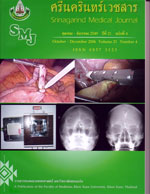Diagnostic Accuracy of Knee Compression-Rotation Test for the Detection of Meniscal Tears
Abstract
Objective: The purpose of this study was to prospectively evaluate the diagnostic sensitivity, specificity and accuracy of a new dynamic clinical examination, named knee compression-rotation test, for detection of meniscal tears.
Study design: Prospective study for diagnostic test
Setting : Srinagarind hospital, Faculty of Medicine, Khon Kaen University
Patients and Methods: The injured knee patients, age from 18-39 years old, were included in this study. These 58 patients underwent knee arthroscopy. During preoperative admission, the author examined the patients and recorded the demographic data, duration of symptoms and the clinical findings including knee compression-rotation test. All patients underwent arthroscopic examination by orthopaedic surgeon who did not involve in this study. Predictive results of preoperative knee compression-rotation test for detection of meniscal tear were compared with arthroscopic findings and calculated as sensitivity, specificity and diagnostic accuracy rates.
Results: In 58 injured knee of 52 males and 6 females were 26.19 + 5.66 years old at the time of hospital admission. Eleven patients sustained injuries from traumatic events and 47 patients sustained sport injuries. Arthroscopic findings were a total of 28 medial meniscal tears, 8 lateral meniscal tears and 9 of both medial and lateral meniscal tears. While the positive knee compression-rotation test was found in 38 patients and 20 patients were negative tests. The sensitivity, specificity and accuracy of the knee compression-rotation test were 84.44, 100 and 87.93% respectively, comparing with the diagnostic arthroscopy.
Conclusion: The sensitivity, specificity and diagnostic accuracy of the knee compression-rotation test are highly corresponded to the arthroscopic diagnosis of meniscal tears. So this test can diagnose the meniscal tear preoperatively and improve the patient surgical management finally.




